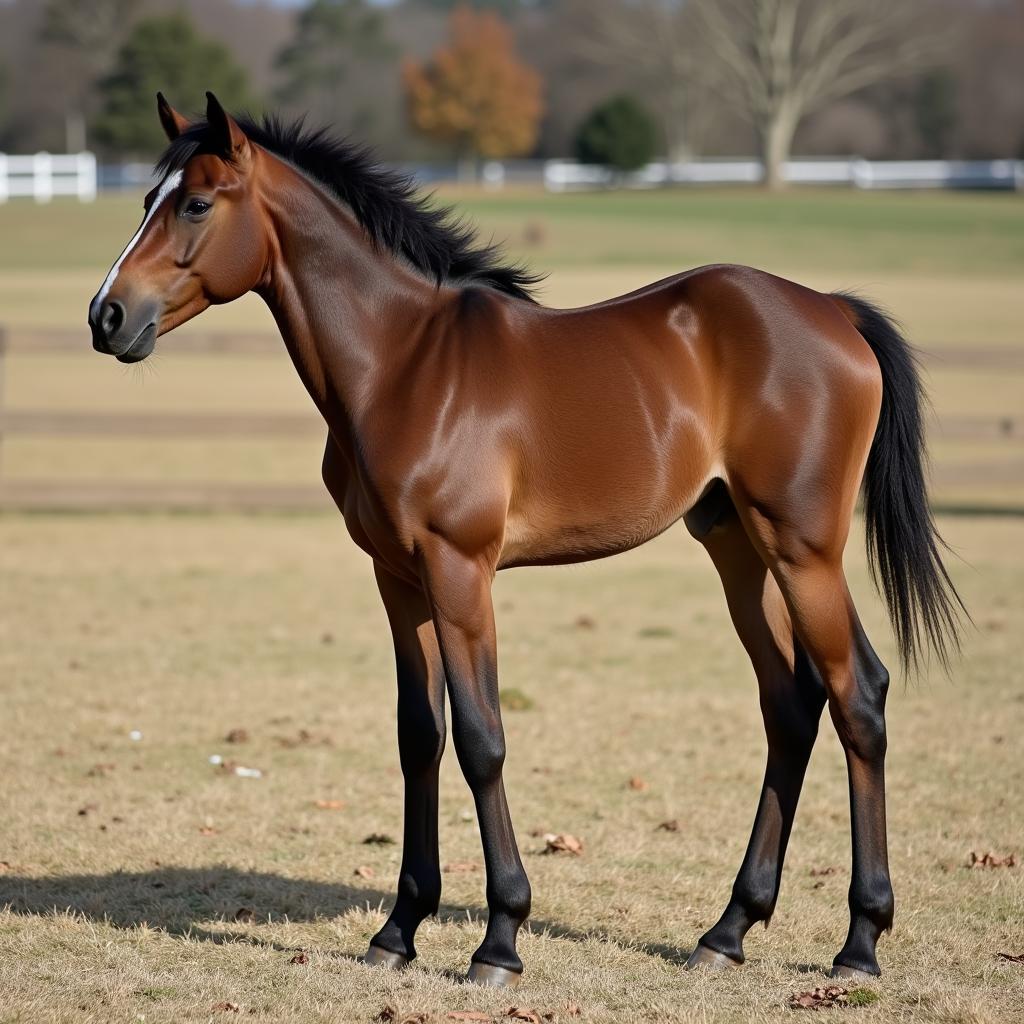Feeder Horses are typically young, underdeveloped equines purchased with the intention of further growth and training. This comprehensive guide explores the factors to consider when purchasing a feeder horse, their care requirements, and common training approaches.
What Exactly is a Feeder Horse?
Unlike horses bred for specific disciplines or those sold as riding companions, feeder horses represent potential. They are often weaned foals or yearlings, sometimes even two-year-olds, requiring additional nutrition and training to reach their full potential. Purchasing a feeder horse can be a cost-effective option for experienced horse owners seeking a project animal.
 Young Feeder Horse in Pasture
Young Feeder Horse in Pasture
Factors to Consider When Buying a Feeder Horse
While the lower purchase price of feeder horses can be alluring, it’s crucial to approach the decision with a clear understanding of the commitment involved. Consider these factors:
- Age and Breed: Younger horses require a longer investment in terms of time, training, and care. Certain breeds are known for maturing faster or possessing specific temperaments, impacting their suitability as feeder horses.
- Conformation and Health: A keen eye for conformation is essential when assessing a feeder horse. Look for straight legs, good bone structure, and a balanced physique. A pre-purchase veterinary exam is crucial to identify any underlying health concerns.
- Temperament: Observing the horse’s behavior around humans and other horses can provide insights into its temperament. A calm, tractable personality is desirable for a feeder horse, making the training process smoother.
- Your Experience Level: Successfully raising and training a feeder horse demands time, patience, and experience. Honestly assess your capabilities and resources before committing to this endeavor.
Essential Care for Feeder Horses
Proper nutrition forms the cornerstone of successfully raising a feeder horse. Their diet should promote healthy growth without causing undue stress on developing joints and bones.
- High-Quality Forage: Provide access to unlimited, good-quality hay or pasture. This forms the foundation of their diet and ensures a steady intake of essential nutrients. Consider a slow feeder horse hay to encourage natural grazing habits and prevent overconsumption.
- Concentrate Feed: Supplement forage with a balanced concentrate feed formulated for growing horses. Consult with a veterinarian or equine nutritionist to determine the appropriate type and amount of feed based on the horse’s age, breed, and activity level.
- Fresh Water and Minerals: Ensure constant access to fresh, clean water and provide a salt lick or mineral block to fulfill their mineral requirements.
- Regular Deworming and Vaccination: Establish a comprehensive deworming and vaccination schedule in consultation with a veterinarian to safeguard their health and well-being.
Training Your Feeder Horse: A Step-by-Step Approach
Training a feeder horse is a gradual process that requires patience, consistency, and positive reinforcement. Here’s a basic roadmap:
- Halter Breaking and Leading: Begin with basic ground manners, ensuring the horse is comfortable wearing a halter and responding to leading cues.
- Desensitization: Introduce the horse to various sights, sounds, and objects they may encounter in their environment, preventing fear and reactivity later on.
- Lunging and Groundwork: Introduce lunging exercises to build the horse’s respect for personal space and teach them to respond to voice commands and body language.
- Saddling and Bridling: Slowly accustom the horse to the weight and feel of a saddle and bridle through gradual desensitization techniques.
- Starting Under Saddle: Enlist the guidance of an experienced trainer to assist with the initial stages of riding the young horse, ensuring a safe and positive experience.
Conclusion
Raising a feeder horse can be a rewarding experience, offering the opportunity to nurture a young equine into its prime. Understanding their unique needs and investing time in proper care, nutrition, and training are crucial for their successful development. Remember, patience, consistency, and a genuine love for horses will pave the way for a fulfilling journey with your feeder horse.
FAQs about Feeder Horses
1. How long does it take to bring a feeder horse to a finished state?
The timeframe varies depending on the horse’s age, breed, and individual temperament, as well as the owner’s experience level. Generally, it can take two to three years or even longer to bring a feeder horse to a riding and training stage where they are considered “finished.”
2. Are feeder horses more prone to health issues?
Feeder horses are not inherently more prone to health issues. However, their young age and underdeveloped immune systems make them susceptible to common equine illnesses. Proper nutrition, vaccination, and regular veterinary care are crucial for maintaining their health.
3. What is the average cost of purchasing a feeder horse?
The price of feeder horses can fluctuate significantly based on factors like breed, conformation, age, and location. It’s recommended to research current market trends and compare prices from reputable sellers before making a purchase.
4. Can I train a feeder horse myself?
While experienced horse owners may choose to train their feeder horses independently, seeking guidance from a qualified trainer, especially during the initial stages, is highly recommended. Professional input can ensure both the horse’s and handler’s safety and promote effective training techniques.
5. Where can I find reputable sellers of feeder horses?
Reputable breeders, equine auctions, and online platforms specializing in horse sales are potential avenues for finding feeder horses. Always conduct thorough research, request references, and visit the seller in person to assess the horses’ living conditions and temperament.
Need More Help?
If you have any more questions or need further assistance, please don’t hesitate to contact us. You can reach our dedicated team of horse enthusiasts at Phone Number: 0772127271, Email: [email protected]. Or visit us at our address: QGM2+WX2, Vị Trung, Vị Thuỷ, Hậu Giang, Việt Nam. We offer 24/7 customer support.
We also encourage you to explore our other informative articles, including those on horse hay feeders for stalls, horse grain slow feeder, horse pellet feeder, and diy slow feeder for horses to further enhance your knowledge and care practices for these magnificent creatures.